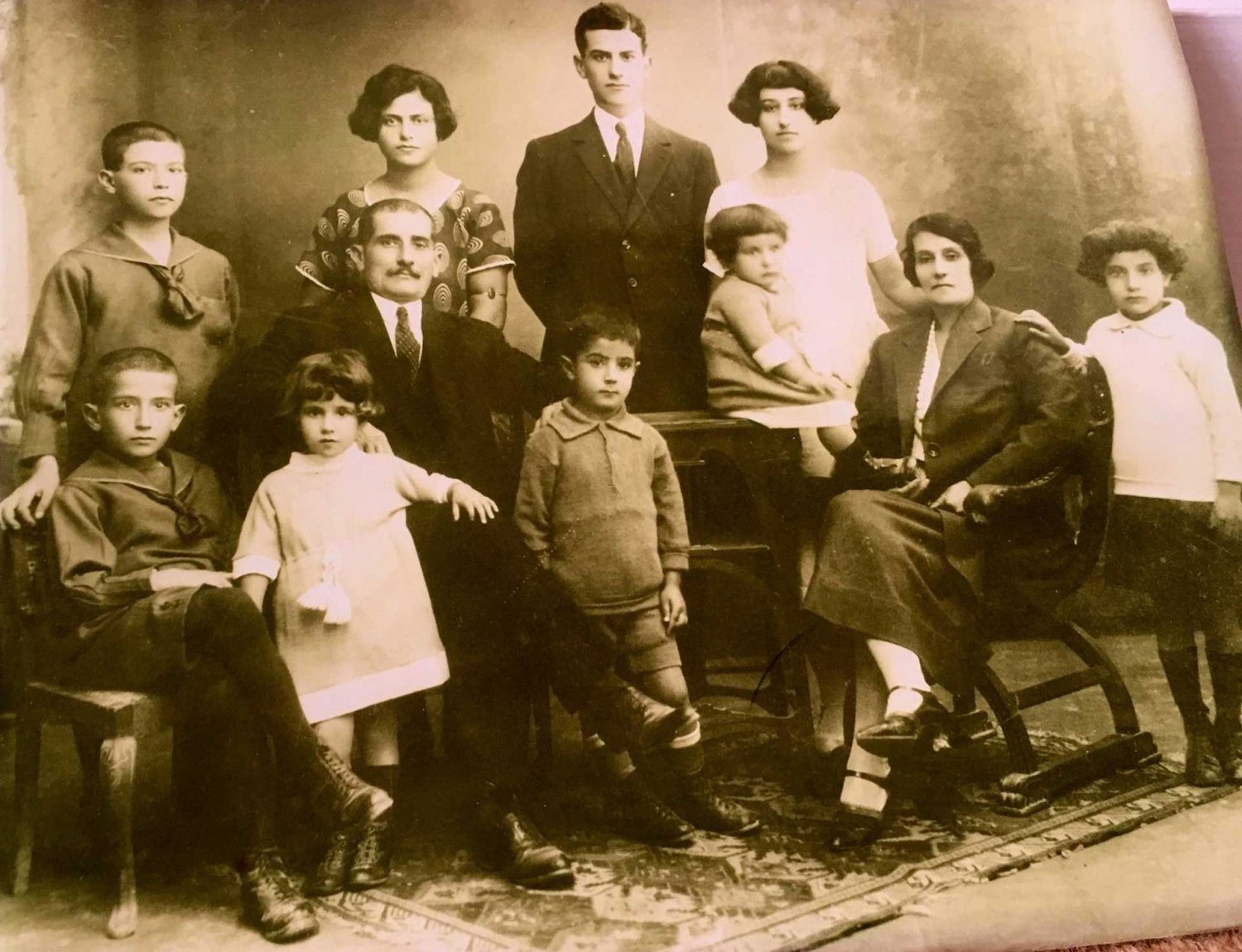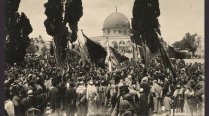Khalil Beidas (b. 1874 in Nazareth) was a journalist, teacher, and school principal who is considered the founder of the short story form in the Levant. He translated many texts from Russian to Arabic. He left behind some 44 books, of which 15 were translations.
Childhood and Education
Khalil Beidas was born in Nazareth in 1874 to a Christian family. His family name was actually “Sabbagh,” but it is said that his uncle called him “Beidas” in reference to a man of legendary strength and courage, traits that he found in his nephew; the name eventually passed on to the entire family. The father, Ibrahim, had a textile business. He passed away at the age of 30, when Khalil was barely five years old. The mother, Warda, remarried, and so Khalil and his sister lived with their grandmother.
Growing up in Nazareth, Beidas attended the elementary Orthodox school and completed his studies there by the age of 12. In 1886, he enrolled in the new teachers’ training seminary (Russian Teachers’ College) in Nazareth, established by the Imperial Orthodox Palestine Society; he graduated from it in 1892. Thereafter, he traveled to Russia, where he got immersed in Russian literature. Upon his return, he worked as headmaster of Russian elementary schools for the next 12 years, first in Syria (until 1894), and then in several other elementary schools in Lebanon. Beidas was an accomplished teacher, and he also wrote books on education curriculums, starting with two texts when he was 23 years old. He wrote mathematics books and a large Arabic encyclopedia (which unfortunately would be lost due to the 1948 War).
Beidas married Adele Abu Rus, a Lebanese teacher. The couple had four sons (Yousef—who later came to be known as “the genius from Jerusalem” and became the founder and chairman of Intra Bank in Beirut—Ibrahim, Emile, and Henry), and four daughters (Mary, Alexandra, Nada, and Rabab).
An-Nafais Al-Assriah
In 1908, Beidas moved back to Haifa with his family, and there he headed and taught at the Orthodox elementary school for three years. That same year, Beidas established a magazine in Haifa which was initially called al-Nafa’is. Three years later, Beidas moved to Jerusalem and represented the Christian Orthodox Arab community of northern Palestine at the Ottoman government’s mixed council (of Arab Orthodox and Greek clergy). When he moved to Jerusalem in 1910, he took his magazine with him, which he published as An-Nafais Al-Assriah (The Modern Treasures). The issues listed “Jerusalem, Palestine” as the place of publication. The publication had a major influence on the Nahda movement (Arab cultural awakening). Beidas dedicated all efforts to make this a successful endeavor, and the magazine was widely distributed to many countries worldwide. It shed light on eminent literary figures, particularly those from Palestine, Syria, and Lebanon, and had readers as far away as Brazil and Australia.
An-Nafais Al-Assriah became the most important literary magazine of its time and a most popular periodical for Arabic-speaking readers. It covered the news of its day and featured short stories, literary contributions, and translations—all with an aim to liberate society through intellect, self-guidance, and legal education. The magazine paused temporarily during World War I, resumed in 1919, and permanently ceased publication in 1923.
Death Sentences
Beidas was critical of Zionist settlement to Palestine, and in articles published in Egyptian magazines such as Al-Ahram and Al-Muqattam, he urged the Ottoman government to treat the Arabs fairly. His political views got him in trouble with the authorities, and he was sentenced to death in 1916. He sought refuge in Jerusalem’s Orthodox Patriarchate, which protected him and saved his life.
His life was put at risk again a few years later. Palestinians opposed the Balfour Declaration, issued by the British government in 1917, and Beidas led the first Arab demonstration in Jerusalem against it in 1921, during the Nabi Musa (Prophet Moses) festival. He denounced the British Mandate’s support of the Zionist movement and warned of the dangers of the Balfour Declaration. The British authorities arrested him and imprisoned him in Acre. He was given a life sentence, but the Orthodox Church helped commute the sentence to 15 years; he served four months. He was freed when British High Commissioner Herbert Samuel decided to release the political prisoners. This decision may have been influenced by the writings of Beidas, who wrote extensively during jail and issued a short treatise describing the harsh treatment of nationalist prisoners. Unfortunately, this work (like much of his library) would get lost during the 1948 War, while some of his experiences were published in a series of articles in his magazine, An-Nafais Al-Assriah.
Translations and Literary Writings
An-Nafais Al-Assriah published essays as well as translations that Beidas himself provided. His translations expanded the horizons of readers, and he became known for his distinctive style that relied not on literal translation but a more realistic depiction of everyday life and human nature. He introduced the works of major writers of Russian literature to the Arabic-speaking world, which influenced great Arab thinkers, authors, and poets (including Ma‘ruf al-Rusafi, Halim Dammus, Wadi‘ al-Bustani, and Qustaki al-Himsi). He himself had a profound influence on Mikhail Naimy, a Lebanese poet, essayist, dramatist, critic, short story writer, and biographer. Other prominent intellectuals of the time whose works were published in the magazine included Khalil Sakakini and Issaf Nashashibi.
Beidas may well hold the record for providing the most translated texts. Between 1899 and 1898, he translated no fewer than four books from Russian into Arabic and six books between 1908 and 1919.
Among his important translations were Alexander Pushkin’s The Captain’s Daughter (Beirut, 1898) and Leo Tolstoy’s The Terrors of Totalitarianism (Haifa, 1909; Cairo, 1929).
Beidas was also a prolific writer who is regarded as the father or pioneer of the Palestinian short story (ra’id al-qissa al-filastiniyya). His 1920 (and only) novel, al-Warith (The Heir or The Inheritor), is considered the first Arab novel that prophesized the Partition Plan, the 1948 War, and the division of the land of Palestine. Described as a social and romantic novel, it was first published in An-Nafais Al-Assriah, and presented a love story between a Jewish woman and an Arab man who ends up in serious debt after his lover leaves him. It has been said that the character resembles an Arab version of Shylock, from Shakespeare’s The Merchant of Venice. The book is considered a classic that moved the Palestinian novel in new, and somewhat more realistic, directions. As fate would have it, the novel was lost due to the 1948 War, but it was rediscovered and reprinted years later.
Beidas published Tarikh al-Quds (History of Jerusalem) in 1922. His first collection of stories, published in 1924, was titled Masarih al-Adhhan (Pastures of the Mind) and displayed his exquisite style of writing.
In addition to his large volumes of writings and translations, Khalil Beidas pursued his work in education and was the senior Arabic teacher at al-Mutran, St. George’s School in Jerusalem, a position he held until his retirement in 1945.
In total, Beidas wrote 44 books, of which 15 were translations from Russian.
Loss of Library
Beidas amassed a valuable library of old manuscripts, compositions, and printed books, as well as a Stradivarius violin. The entire collection was lost to him when Zionist militias attacked his Jerusalem home during the 1948 War.
Edward Said, whose father was related to Khalil Beidas, writes that Beidas and his family had to leave their house in Upper Baq‘a after the entire quarter fell to the Zionist military forces of the Haganah. In his biography, Said describes Beidas as a colorful character who fascinated him in his early years in Jerusalem and describes him as an exceptional novelist and literary critic:
There was one very colourful character in those early Jerusalem years who fascinated me, even though I had no idea until much later who he really was. My father’s unappeasable appetite for playing tawlah [backgammon] was often satisfied it seemed by an elderly, heavily mustachioed man who always wore a dark suit and tarbush, smoked cigarettes incessantly through an ivory holder, and with an alarming frequency coughed his way through the smoke that circled his head. He was Khalil Beidas, my father’s cousin, and the senior Arabic teacher at St. George’s; I never saw him at school, however, and did not know about his professional connection to it until four decades later, when my cousin Yousif told me that Beida had been his Arabic instructor . . .
During the twenties and thirties, he contributed to the construction of a Palestinian national identity, particularly in its encounter with the incoming Zionist settlers. It is a sign of how overprotected and ignorant I was as a boy of our political situation that I only thought of him as a quaint old man with a racking cigarette cough and—when he played tawlah with my father—a rollicking, very jovial manner, all of which, I discovered a few years later, did not survive the loss of his country. Unlike his children, he was spared the fate of refugee.1
Beidas was among the last people forced to vacate his home in the Upper Baq‘a neighborhood of the New City area of Jerusalem, which subsequently fell under Israeli control and became West Jerusalem. At the age of 73, he had to walk on foot to Silwan in East Jerusalem (which was under Jordanian control); he fainted once he arrived at the village. The neighbors helped him make his way to Amman, and he proceeded from there to join his family in Beirut. Beidas died the next year. His library was plundered; some of his volumes are thought to reside within the Jewish National Library at the Hebrew University of Jerusalem.
Honors and Awards
After his death, Beidas was celebrated as an exceptional translator.
In 1990, the Palestine Liberation Organization (PLO) awarded him the Jerusalem Medal for Culture, Arts, and Literature.
Various events have been held to honor his memory, most recently in 2020, when the YMCA of Gaza and Tejwal Center for Arts and Culture organized a literary symposium in Gaza honoring him after 70 years since his passing. The event celebrated his important role in the literary field as well as in politics.
Death
Beidas died on February 9, 1949, in Beirut, Lebanon.


